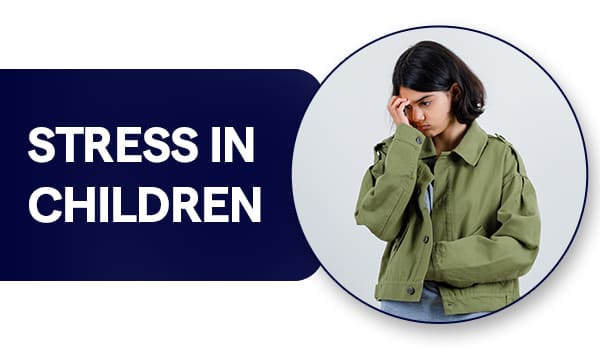
Symptoms of stress in children:
Understanding the above symptoms of stress in kids is important, as it directly impacts their physical, emotional, and overall development.
Academic pressure is one of the most common conditions in which kids experience stress. With high expectations, a heavy workload, and the pursuit of good grades, many students feel overwhelmed and anxious about their academic performance. In many cases, this leads to burnout, anxiety, and even depression.
Peer pressure is also one of the paramount reasons, which can also weigh heavily on young minds. Divorce, Arguments, and Financial troubles can all add to their stress levels, making it difficult for them to focus on other areas of their lives. These issues also lead to feelings of insecurity, anxiety, and even trauma in some cases.
Navigating the social circle can also be challenging for young people. Fitting in, maintaining friendships, and understanding social rules are challenges that young people face frequently. This is particularly difficult for those who feel introverted or isolated, as they usually struggle to find acceptance or support from others. Moving, changing schools, entering puberty, and experiencing judgment are all life events that are both exciting and difficult at the same time.
Social media and dating applications also contribute significantly to stress in children's lives. Social media create a feeling of constant comparison, leading to low self-esteem, eating, and mental disorders. Children feel pressure to present a perfect image of themselves online, leading to a fear of missing out (FOMO) and social isolation. Moreover, dating applications are also a source of stress for children and teenagers, as they feel the pressure to fit in and gain acceptance from their peers. The pressure to have a perfect image and social norms can lead to negative consequences like addiction, harassment, and cyberbullying. While this is particularly concerning for teen girls, reports show that 46% of teens 13 to 17 years old said social media made them feel worse about their bodies. According to the Digital Wellbeing 2020 study, nearly half of teenagers confess to being addicted to their smartphones, with a majority stating that their relationship with digital has a negative impact on important aspects of their lives, such as diet, sleep, exercise, and schoolwork.
Children are often exposed to harmful content, including violence, racism, hate, and pornography, sometimes unintentionally stumbling upon it. Upon encountering pornography for the first time, young people reported experiencing a mix of curiosity, shock, confusion, and disgust.
Young girls are more likely to be targeted through social media, although boys are not exempt. Psychological studies have connected cyberbullying to depression, anxiety, and a higher risk of suicidal thoughts. Teenagers are especially vulnerable to cyberbullying, and failure to take necessary actions promptly can result in serious consequences.
Social media at night can disrupt a child's sleep, which is crucial for children between the ages of 5 and 16 to get 9 to 11 hours of sleep each night. Inadequate sleep can negatively impact their school learning and increase the risk of depression and anxiety.
Stress impacts the overall body health of young kids. Chronic stress weakens the immune system, making them more susceptible to illnesses. It contributes to developing major physical concerns such as headaches, migraines, stomachaches, and muscle tension.
The most current NCRB statistics indicate that 13,089 students took their own lives in 2021, a 32.5% increase from the 9,905 fatalities that occurred in 2017. In 2021, this would equate to around 36 student suicides in India every day.
In addition to understanding and addressing stress in their children, parents should prioritize their pediatric overall health and well-being. It is essential to take care of their physical, emotional, and psychological needs and seek medical attention if necessary. By doing so, parents can ensure that their children are healthy and happy, both physically and mentally.
Parents should have open communication with their children. This is one of the most important steps in managing stress. Creating a supportive environment for your children and teenagers empowers them to express their emotions and concerns. Additionally, carefully observing changes in behavior, mood, and physical symptoms can provide valuable stress indicators and help parents intervene early. Providing a safe, nurturing, and non-judgmental space where children and teenagers feel secure and equipped to face challenges is essential. Parents and educators can also equip young individuals with stress management techniques like deep breathing, mindfulness, and physical exercise.
Don't wait until it's too late. 1 in 10 children experiences stress symptoms, and it's crucial to intervene and provide the necessary support and care.
Sir Ganga Ram Hospital's Pediatrics department understands the multidimensional impact of stress on children and its impact on their well-being. Our team of doctors has worked with parents, educators, and individuals to develop personalized treatment plans of Guidance sessions for Parents about Adolescent Care that promote emotional well-being and health. For more information, book an appointment with Sir Ganga Ram Hospital.
Source: https://health.clevelandclinic.org/dangers-of-social-media-for-youth